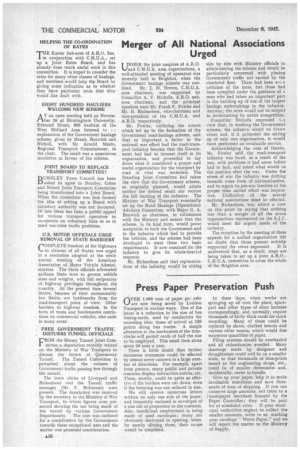Merger of All National Associations Urged
Page 18

If you've noticed an error in this article please click here to report it so we can fix it.
VENDER the joint auspices of A.R.O. V and C.M.U.A. area organizations, a well-attended meeting of operators was recently held in Brighton, when the Government haulage scheme was out lined. Mr. J. H, Brown, C.M.U.A. area chairman, was supported by Councillor A. V. Nicholls, A.R.O. subarea chairman, and the principal speakers were Mr. Frank F. Fowler and Mr. D. Richardson, vice-chairman and vice-president of the C.M.U.A. and A.R.O. respectively.
Mr. Fowler, outlining the events which led up to the formation of the Government road-haulage scheme, said that so important a factor in the national war effort had the road-transport industry become that the Government had had to interest itself in its organization, and proceeded to lay down what it considered a proper and useful organization for the transport by road of vital war, materials. The Standing Joint Committee had taken the view that the Government scheme, as originally planned, would attain neither the desired result nor receive the full backing of the industry. The Minister of War Transport eventually set up the Road Haulage (Operations) Advisory Committee, with Major G. A. Renwick as chairman, to collaborate with the Ministry and ensure that the scheme, in its final form, would prove acceptable to both the Government and to the industry which had to provide the vehicles, and the scheme had been developed to meet these two basic requirements. It now remained for the industry to give its whole-heartsd response.
Mr. Richardson said that representatives of the industry would be sitting side by side with Ministry officials in administering the scheme and would be particularly concerned with placing Government traffic not carried by the chartered fleet. There had been scnse criticism of the rates, but these had been compiled under the guidance of a man who had taken an important part in the building up of one of the largest haulage undertakings in the industry. Anyway, the rates would not be subject to undercutting by unfair competition.
Councillor Nicholls expressed t: e view that, in working the Government scheme, the industry would be drawn closer and, if it promoted the setting up of only one organization, it would have performed an invaluable service, Acknowledging the vote of thanks, Mr. Fowler said the road-transport industry was faced, as a result of the war, with problems it had never before had to face, and asked what would be the position after the war. Under the stress of war the industry•was drifting towards some form of nationalization, and to regain its pre-war freedom at the proper time united effort was imperative. Unification of the several national associations must be effected.
Mr. Richardson, too, added a view on this point by saying that nothing less than a merger of all the seven organizations represented on the S.J.C. would meet the urgent needs of the industry.
The reception by the meeting of these appeals for a unified organization left no doubt that those present entirely supported" the views expressed. It is understood that, as a result, steps are being taken to set up a joint A.R.O.C.M.U.A. committee to cover the whole of the Brighton area,




















































